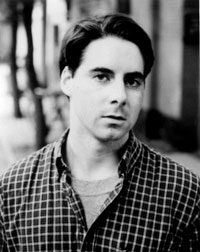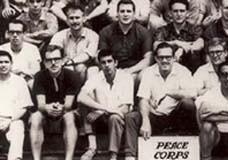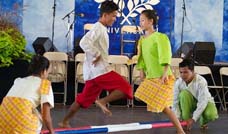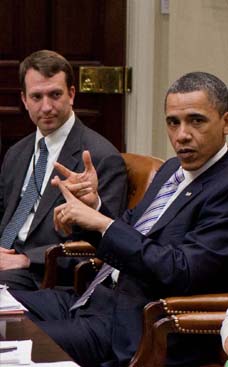
"For many years, I wrote about China. And in this interim period, I've been writing about Colorado, but also some stories in Nepal and Japan. Pretty soon, it'll be Egypt. I tend to focus in on a place or an individual. I like to write about people who I'd like to think of as average people -- normal individuals who are part of a community. Partly because I don't think they get written about as much. I think also when you're writing about celebrities or other famous people, they're accustomed to speaking to the press and are not necessarily as open, or even as honest. Within these communities, I've often written about people who are somewhat of an outsider. That has been a theme. I think that's an issue of perspective. People who are outsiders sometimes are more observant and their role is sometimes more interesting," says Hessler. "There was also this sense that this is an area that gets written about in certain ways and there are a lot of things that aren't being touched on or covered. All my friends that live there, in Cairo, tell me that Egypt is a really funny place, that Egyptians have a great sense of humor, and we never read anything like that in the press. It's all very serious. There was a time when China was like that, too. In the Nineties when I went to China, the image we had in the press was of this really dark place that's very serious. When you get there, there's all this light and it's very funny. And humor was how I tried to bring China to life. My writing is fundamentally serious, but humor was part of it. And I suspect that will be part of it in Egypt as well." Author Peter Hessler served as a Peace Corps Volunteer in China.
MacArthur Award Winner Peter Hessler to Study Arabic in Egypt
Peter Hessler: Q&A with winner of MacArthur Foundation genius grant and cool half million
By Jenny An Tue., Sep. 20 2011 at 3:29 PM
Categories: Media
hessler.jpg
Peter Hessler.
​Colorado-based writer Peter Hessler, best known for his articles and books on China, won a MacArthur Fellowship.
Colloquially called the "genius" grant, the $500,000 award, paid out over five years, is a blank check for the recipient to pursue his or her creative ambitions. For Hessler, that means learning Arabic and moving to Cairo.
Hessler has written about Colorado for the New Yorker, including a 2010 feature on Uranium mining and a story in this week's issue about a small-town pharmacist in Nucla.
"It's great. It's disorienting. This has been a crazy month as it was," Hessler says about the win. He's preparing for an October move to Cairo and has been learning Arabic over the summer with his wife, Leslie T. Chang, who is also a non-fiction writer. "I feel like I've been juggling a lot and then suddenly all this happened. My head just feels turned around."
The Ridgway-based long-form journalist (think articles that make Westword cover stories look breezy) has also written for the New York Times, National Geographic and the Atlantic, in addition to having written three best-selling books on China: River Town: Two Years on the Yangtze (2001), Oracle Bones: A Journey Between China's Past and Present (2006) and Country Driving: A Chinese Road Trip (2010).
Hessler moved to China in 1996 for a two-year stint teaching English through the Peace Corps; he was based in a remote area of Sichuan in central China that was just about to be flooded by the Three Gorges Dam. That experience formed the bedrock for River Town. By 2000, he was the Beijing correspondent for The New Yorker, a post he held until 2007. While his work touches upon politics in China, he lavished attention on the experiences of ordinary citizens -- from graduating college to driving.
In 2007, Hessler left Beijing and ended up in southwestern Colorado. It was a temporary move, and soon the family (including identical twin daughters Ariel and Natasha) will be headed to Egypt.
There were a total of 22 MacArthur fellows this year, with interests ranging from sports medicine to architecture to musical composition. Since the fellowship's 1981 inception, 850 fellows have been named.
Here's our Hessler Q&A:
Westword (Jenny An): How fluent are you in Arabic?
Peter Hessler: None. None at all, but we did an intensive three-month course and got a good foundation. Once we go there and immerse ourselves, we'll hopefully be able to pick it up very quickly. I think it's very possible to learn at this age [Hessler is 42]. I hope.
WW: When do you plan on starting to report in Arabic?
PH: I don't have a plan. One of the nice things about this award is that it helps to be patient as a writer. There will probably be things I want to write about quickly, but there will also be things I want to wait on. The main thing is to feel it out and make sure that you're comfortable when you're writing.
I've never been somebody who likes to rush my projects, and now I can take a really long time. That story about Nucla, Colorado, which is a town of 600 people, I reported that for a year and a half. Not every day, but I'm spending time down there and talking to people.
Sometimes it just takes time for things to unfold. That's always been really important to me as a writer, and one of the things I'll take away from this award is patience.
WW: What does time do that nothing else can?
PH: In China, time was really important to me, because things changed so quickly there that I could often follow a community or individual for a period of a year, or a few years, and you'd see remarkable changes.
As a non-fiction writer, that kind of gives you a plot. It gives you movement. That's often the hard part of being a non-fiction writer -- to have plot. So instead of back-reporting stuff, you can really watch it unfold and see how people respond in real time.
Sometimes it just helps you understand a place better. I wasn't following Nucla in that way. It wasn't a boomtown like in China, but just spending time there allowed me to get to know people, and people would trust me more. And I get a better feel of what's important to them and what their values were. In that case, time played a different role, but when it comes to long-form journalism, time is always critical.
WW: You write about a lot of different places. What attracts you to a place?
PH: For many years, I wrote about China. And in this interim period, I've been writing about Colorado, but also some stories in Nepal and Japan. Pretty soon, it'll be Egypt. I tend to focus in on a place or an individual.
I like to write about people who I'd like to think of as average people -- normal individuals who are part of a community. Partly because I don't think they get written about as much. I think also when you're writing about celebrities or other famous people, they're accustomed to speaking to the press and are not necessarily as open, or even as honest.
Within these communities, I've often written about people who are somewhat of an outsider. That has been a theme. I think that's an issue of perspective. People who are outsiders sometimes are more observant and their role is sometimes more interesting.
WW: You've mentioned in previous interviews that you don't always like to write about politics, and prefer writing about ordinary people. What do you hope to find in Egypt at this moment?
PH: A lot of the stuff I've written has been political, but the politics come in on the tail end. I don't like to start a project with a political idea. I'd prefer to just see what kind of political issues come up naturally.
In my last book [Country Driving], one section was about a village, and I was basically following this one family in a village, and so it's not overtly political. I'm beginning with this community and these individuals. Turns out there was a tremendous amount of politics involved, and following this family taught me a lot about the Communist Party in China, because one member of the family joined the Community Party and I could see what it did to him. But I prefer it to happen naturally.
I think this is a very political moment in Egypt, and so I think anything you write about is going to have some political sense to it. But I prefer to have the starting point be something a little more organic.
WW: Have you ever visited Cairo?
PH: No, I never have. It's a little crazy with my wife and I moving there with two one-year-old daughters.
WW: How did you make the decision to go there?
PH: We actually decided this many years ago. When we were leaving China in 2007, we were sort of figuring that we'd spend a couple years in the States, since each of us had a book to write [Chang's book came out in 2008 and is called Factory Girls: From Village to City in a Changing China]. And then we thought we'd move to the Middle East.
We liked it because it is where there is an interest. I can write for The New Yorker from the Middle East, and it'd be harder from some other places in the world. It seemed like an interesting area, and we liked the fact that it is a very rich language and that there is a deep culture. There's a lot of ancient history as well. I liked in China having this combination of the past and present.
There was also this sense that this is an area that gets written about in certain ways and there are a lot of things that aren't being touched on or covered. All my friends that live there, in Cairo, tell me that Egypt is a really funny place, that Egyptians have a great sense of humor, and we never read anything like that in the press. It's all very serious.
There was a time when China was like that, too. In the Nineties when I went to China, the image we had in the press was of this really dark place that's very serious. When you get there, there's all this light and it's very funny. And humor was how I tried to bring China to life.
My writing is fundamentally serious, but humor was part of it. And I suspect that will be part of it in Egypt as well.
WW: How did you end up in Colorado?
PH: It was pretty random. My wife and I had finished researching books -- she had finished and I was almost finished. So we kind of decided that we could live anywhere. We basically had two years of work ahead of us that was very portable, and we didn't have children at that point. So it was a really unusual time in our lives, when we could really live anywhere.
So we just decided, why don't we drive around the Southwest and find a place? We just drove around. I had never heard of Ridgway, but we liked the town, and we found a house in a beautiful spot. We just decided it'd be a good place to write.
We realized also that this was after China and before Egypt. We knew when we made this move that we were moving to the Middle East and most likely living in a big city that's crowded and has the problems that big cities in the developing world have. It has been a little bit of a detox.
WW: What did you like about the town?
PH: It was stunningly beautiful, and we knew it'd be a real shock of a transition from China. I kind of like doing things like that. I just feel like you might as well go 180 degrees, which is what we're about to do in Cairo. I think it's invigorating and forces you to notice things.
WW: What are you planning on doing with the MacArthur money?
PH: There's no specific... it'll go toward Arabic lessons in Cairo and it'll go toward this move. I write for The New Yorker, but I'm not salaried. I'm basically a freelancer. I have a regular contract with them, but I still get paid by the word. And during this period, we're sort of taking a risk. We're studying Arabic for two months, which means two months that I'm not working. And this initial period in Cairo, I expect to be heavily weighted toward language study.
This grant helps support that and helps keep me patient and develop at a natural pace.
WW: The MacArthur is awarded for creativity. What is creative about your approach to journalism and non-fiction?
PH: I originally wanted to be a novelist, and that's what I studied in college. That was the plan, to be a fiction writer. So to me it was a revelation when, as a junior in college, I got to take John McPhee's nonfiction writing class [at Princeton] and suddenly realize that with nonfiction writing, with reporting, you could do all kinds of interesting things with structure and voice and the way you write -- even the way you investigate things.
To me, non-fiction writing is incredibly creative, and sometimes people don't realize that. You're making a lot of decisions.
















